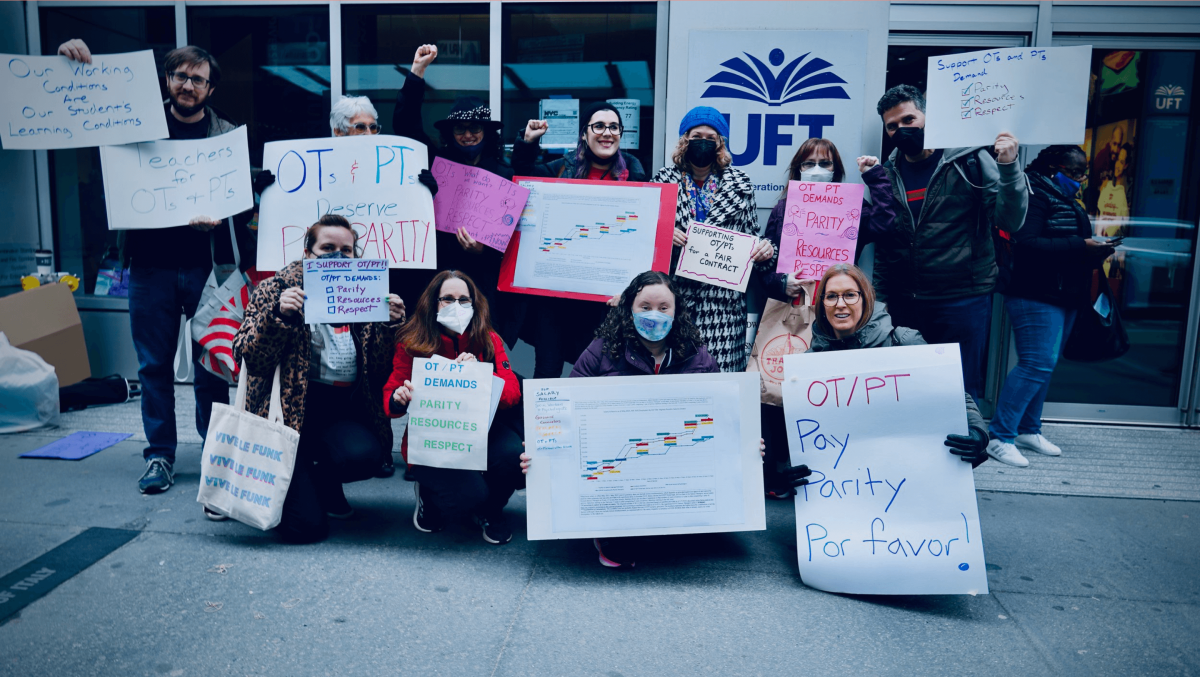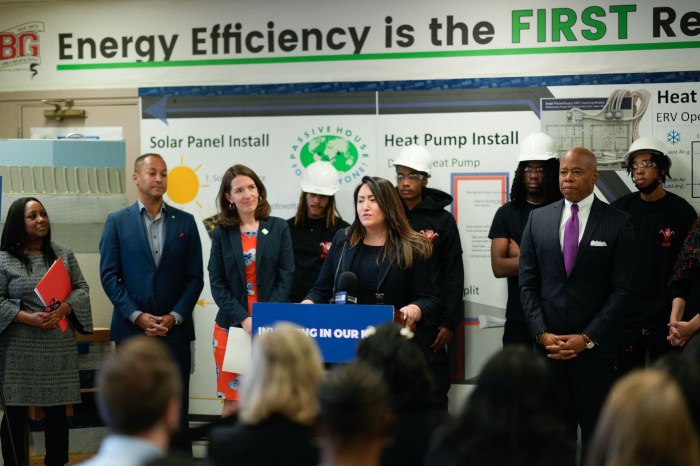United Federation of Teacher members who are occupational and physical therapists overwhelmingly voted against the ratification of the five-year contract between the UFT and the city.
Many occupational and physical therapists had been demanding that the contract include higher wages and pay equity between them and other public school employees, such as teachers and speech therapists.
The UFT contract, which was otherwise approved on Monday, July 10, was voted down by the therapists with a vote of 1,129 against and 782 in favor.
The chapter, which also voted against the 2018 UFT contract, is comprised of 2,963 people who work mostly as occupational and physical therapists working for the New York City Department of Education. The chapter, which later approved a contract in 2018 through a revote, also includes nurses, audiologists, and supervisors.
Each separate contract requires the approval of more than 50% votes cast by the respective bargaining unit.
Because the chapter majority voted against the new contract, this meant that the previous contract still stands and that “all the new contractual benefits, including the pay increases and the $3,000 ratification bonus, will not be available for the therapists, school nurses, audiologists and supervisors of nurses and therapists covered by this contract,” according to an email sent Monday from UFT Vice President Richard Mantell.
Melissa Williams, the UFT chapter leader for occupational and physical therapists, told amNewYork Metro that the new contract displays both a “lack of respect for us as professionals and our students.”
“These are some of the most vulnerable people in our country,” Williams said. “They deserve the care of well-paid professionals that don’t have to rush off at the end of the day and go work a second job or sometimes a third job to be able to make ends meet.”
Williams is an occupational therapist who has worked for the DOE for nine years and described herself as a “working person who lives, works, and tries to survive in the city.” She said her income spanning over her 15-year career, adjusted for inflation and including several years not working for the DOE, has only increased by about $3,000.
She said she’s trying to save money for her 13-year-old son’s college — all while still paying off roughly $21,000 in college debt, despite having graduated in 2008.
“I’m actually at a point where I’m trying to conceive of how my son is going to be able to afford to live in the city as an adult,” Williams said. “It’s scary.”
The New York City Office of Labor Relations, which is involved with the contract negotiations, referred amNewYork Metro to the UFT upon request for comment.
Dick Riley, UFT spokesperson, told amNewYork Metro that the larger union “will be meeting with members of the chapter to discuss further steps.”
Mantell also acknowledged in his Monday email that “the contract covering occupational and physical therapists, school nurses, audiologists and supervisors of nurses and therapists was the only DOE-UFT contract not ratified.”
Williams recalled the chapter’s first bargaining session with the city where she described modern-day working conditions for her chapter’s members, including a group of Brooklyn-based therapists who allegedly worked inside of a windowless hot, basement room.
“We’re still fighting some of the same fights,” Williams said.
“We don’t know how long the city is going to not go back to the table,” Williams said. “I am going to continue to organize with the people in my chapter that I know have the energy and the will to fight.”
Susan Paul, an occupational therapist who has worked for the DOE for nearly a decade, told amNewYork Metro that the chapter is left with a “fight where we can stand and be respected.” She, too, works multiple jobs but still struggles to live in New York City amid rising costs and inflation.
“As a woman, as an occupational therapist, as a Black woman, my struggle is real,” Paul said. “Why do I have to have three jobs in order for me to maintain my life?”
Paul, like Williams, was part of her chapter’s negotiation team and recalled feeling like the city was “not interested in any of what we wanted.” She reiterated the chapter’s main demand of pay parity, but also raised equity parity in terms of credentialing. Paul said she is getting considerably less for her master’s degree compared to the other DOE employees with the same education credentials.
Following the ratification of all the other contracts, UFT leadership arranged a meeting with the chapter on Thursday. There were some potentially promising sentiments that UFT President Michael Mulgrew had expressed. One occupational therapist expressed that “Mulgrew seemed kind of open to the ideas of moving money around,” but nothing is certain at the moment.
Alison Loebel, physical therapist with the DOE since 2001, told amNewYork Metro that throughout the negotiation period over the past several months, the chapter had been trying to get especially closer to the pay of employees who provide special education services.
“There’s a lot in our contract that is different,” Loebel said. “We’re generally far below teacher salaries.”
Loebel said that she fears that in five years when a new contract comes around, that any extra money for occupational and physical therapists will be tied to an extra session that therapists would be potentially required to work, despite therapists “already struggling to complete all our work during contractual hours,” Williams said.
She said that while the $3,000 pensionable, ratification bonus, was a “win” for the contracts, she feels that was still worth risking for the larger fight towards pay parity.
“I think therapists, both in 2018 and now, are willing to risk losing some,” Loebel said. “It just feels like we’re getting close to where we deserve to be.”



































